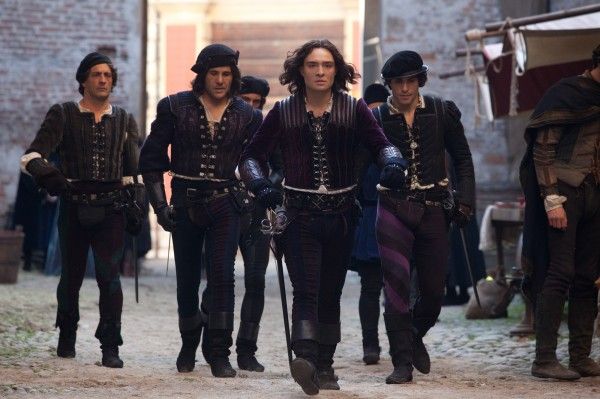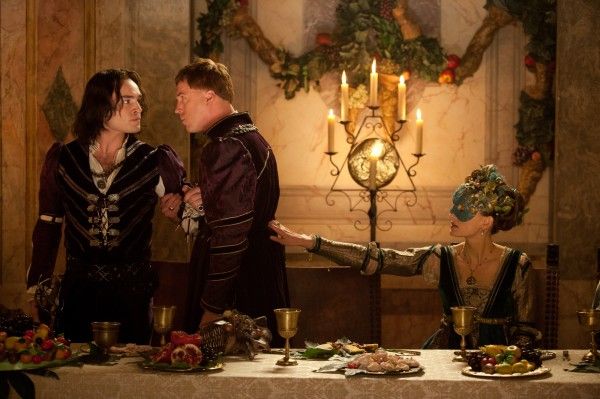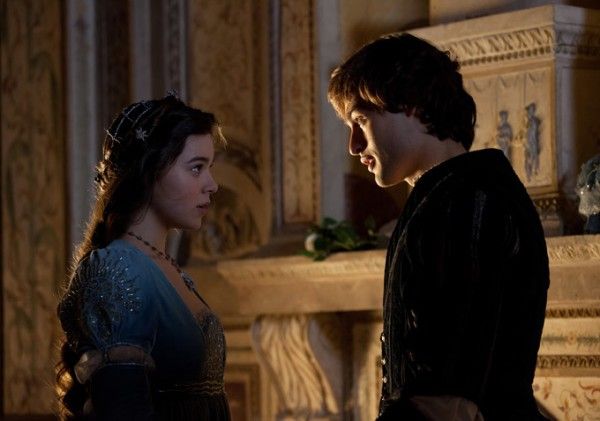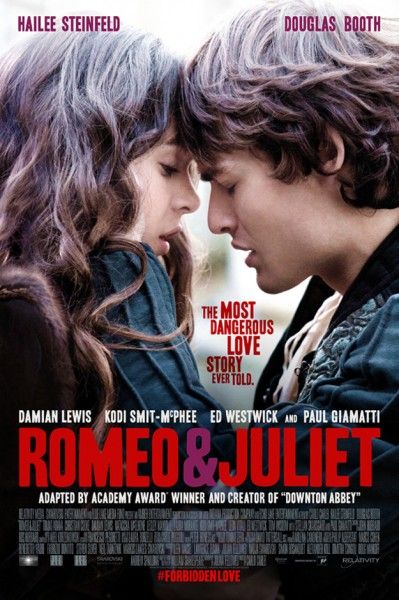Romeo & Juliet is the timeless story of star-crossed lovers from warring families. The families of Montague and Capulet will use any excuse to publicly fight in the streets of Verona, so when Romeo (Douglas Booth) falls for Juliet (Hailee Steinfeld), it quickly receives the wrath of both of their families, when all they want to do is be together forever. Written by Julian Fellowes (Downton Abbey) and directed by Carlo Carlei, the film also stars Paul Giamatti, Damian Lewis, Natascha McElhone, Ed Westwick, Kodi Smit-McPhee and Lesley Manville.
During this recent exclusive phone interview with Collider, actor Ed Westwick (“Tybalt”) talked about his first exposure to Shakespeare, why he was so drawn to this take on Romeo & Juliet, how he formed his take on Tybalt, and how much he enjoyed getting to do the fight scenes. He also talked about being a part of the vampire genre while getting to poke a little bit of fun at it for the feature film Kitchen Sink, acting through prosthetics, and what excites him about a role. Check out what he had to say after the jump.
Collider: What was your first exposure to Shakespeare, and was it something you immediately fell in love with, or did you have to acquire an appreciation for it?
ED WESTWICK: I grew up with it. As a young actor, I was always aware of the brilliant work of Shakespeare. We studied Romeo & Juliet and Macbeth in school. As a young actor, you’re always mystified and intrigued by such brilliant work. To actually have the chance to be involved in this production was a wonderful thing for me.
When the idea of this was brought to you, did you immediately get excited, or did you want to run for the hills at the thought of tackling Romeo & Juliet?
WESTWICK: I was actually aware of the project about three years ago, in fact. I read the script and I said to my representation, “I have to do this. I want to be involved.” I thought the rendition of the story was wonderful and I really felt like it had a lot of potential. I really, really wanted to get my shot at a different Tybalt, and I hope I communicated that. In [Franco] Zeffirelli’s version, Tybalt is played very differently. He’s a bit more of a dandy with a strange edge, but I didn’t want to play him as that. I wanted to play him as somewhat of an individual trapped between generations. That period in Renaissance Italy, there was a huge shift away from what preceded, into an era where business was becoming more prominent in trade, and everything like that. And I felt like Tybalt was somebody who was trapped between generations and trying to find his place. I wanted to play him like more of a soldier, and as somebody who was struggling with the shift in society. Hopefully, that came across.
In tackling something of this magnitude, did you dive into the original text again, or watch any previous versions, or did you just work with the script that you had been given?
WESTWICK: I read the script and I actually did a lot of research into the period in Renaissance Italy. That’s what I based my take on. And then, reading the script helped me build it around that, and I just went from there. I didn’t really look into anyone else’s work, who had done it before. I don’t think that’s what you should do. You’re not trying to emulate or impersonate another person’s performance. That’s just the way that I work. I want it to be my own.
Does the language of Shakespeare come easily for you, or does it take some time to get it to sound natural?
WESTWICK: Obviously, there’s the adaptation of this version. The original verse is changed, to some degree. What the beauty of that is, is that it opens it up for this generation and makes it a little bit more accessible. Hopefully, we’re able to convey the essence of the story to a generation that might not have as much exposure to it or time spent on understanding old English. Of course, I struggle to understand the meaning of a lot of the dialogue. I’ve been to see countless numbers of Shakespeare plays. Another way to make it accessible is also in the performance. I saw Jude Law do Hamlet twice, a couple of years ago, and he did it in a way where he accentuated what he was saying through body language and his tone. I think that’s another way to make it more accessible.
Because this is a project that you can’t really improvise on, at all, did you ever find yourself getting stuck on a word or two, or did you spend a lot of time preparing beforehand, so that that wouldn’t happen?
WESTWICK: Obviously, I prepare and I spend a lot of time making sure I understand what I’m doing. That would be my job. So, I was ready to go. The whole thing was so challenging because it was just so different, but I jumped in with both feet and hopefully it comes across as a piece of dedicated work that I’m actually very proud of.
Was it fun to get to do so much physical work with this and get to have some fight scenes?
WESTWICK: Absolutely! We worked with these incredible guys who taught us brilliantly and broke it down for us. It was a lot of fun, getting to learn the choreography for that. It was a hugely enjoyable part of it.
Was it fun to have the younger cast, that was around your age, and then also have some amazing older actors there?
WESTWICK: Yeah, absolutely! Films are about a collaboration of people. It’s a whole team effort. With Romeo & Juliet, we had a fantastic cast and a fantastic crew. It was our baby. It wasn’t just mine. It was our baby for everybody involved. We wanted to do something that was different and unique, and hopefully we have done that.
What was it like to get to be a part of a film like Kitchen Sink, where you get to join the vampire genre while also getting to poke a little bit of fun at it?
WESTWICK: Well, that was it for me. I didn’t think I’d ever want to play a vampire, especially after how much it’s become a part of pop culture. But, with a project like Kitchen Sink, it’s so unique and it pokes fun at a lot of the notions and ideas that we have now about these kinds of genres. I just finished the film, and it was an amazing experience. I’m looking forward to seeing how that works out. One of the most tricky bits for me was that it was the first time I was wearing prosthetics, when my character actually becomes full, angry vampire. It’s a very interesting thing, as an actor, because you’re no longer relying on subtle movements in the face or eyes. You have a mask on, which you try to move even more. So, it was interesting. It was a first for me.
Coming off of Gossip Girl, did you put a lot of thought into the types of roles you wanted to pursue, especially directly after it ended, to break that mold that people start to see you in, as a result of playing a character for a few seasons?
WESTWICK: Absolutely! It was very important to me. I’m somebody who had a great privilege, being a part of Gossip Girl and playing that character, but that’s not the be all and end all. What I want to do is other projects where I get to play with other characters, and hopefully give some performances that people will enjoy in a different way.
What is it that gets you excited about a role versus turning down a role?
WESTWICK: When you read something, you have to feel connected to it. The story is always important. And then, you want to work with people that inspire you and that you’re gonna learn from. I’m a young actor and I’m still trying to learn, every day. I’ve had a great run, so far, meeting and working with people who are just incredible. If the script is great and the character is something that appeals to me, then I’ll fight to be a part of that.
Do you have any idea what you’re going to do next?
WESTWICK: I’m looking at a few things. I do have two things where we’re just waiting to see if everything comes together, so it wouldn’t be the right time to mention them right now. But, I’m looking forward and I’m excited for the next one.
Romeo & Juliet is now playing in theaters.





